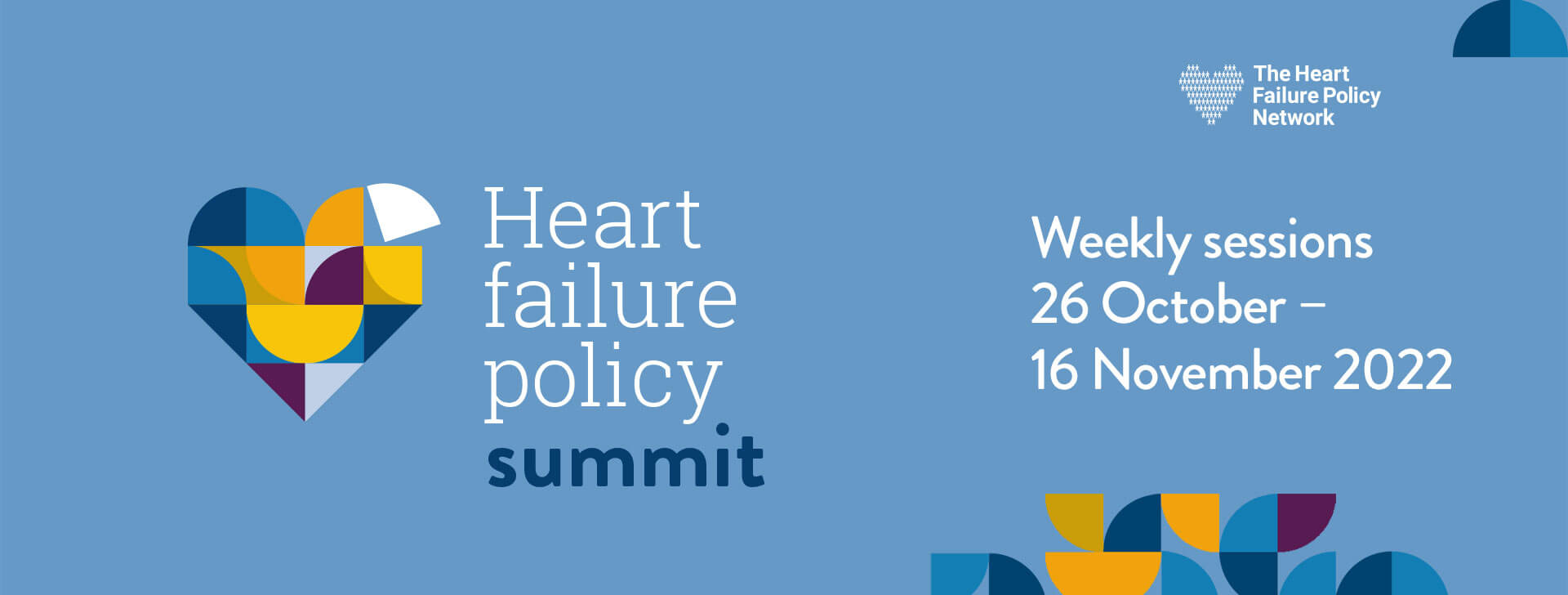
People advocating for the care and wellbeing of the millions of individuals living with heart failure will come together at the forthcoming Heart Failure Policy Summit to make alliances across multiple conditions and link to broader health policy agendas. The event, which begins on Wednesday 26 October and will run for four consecutive Wednesdays, will bring the whole-person perspective into focus. It will address the interconnectedness of heart failure with other non-communicable diseases (NCDs) and COVID-19, and the real lived experience of people with the syndrome.
Why do we place this emphasis on connecting heart failure with other conditions? Mortality data, hospitalisations and the experience of COVID-19 compel us to broaden our focus.
While mortality from cardiovascular disease (CVD) for people diagnosed with heart failure has fallen dramatically since 2000, the all-cause mortality rate for this population has remained stubbornly high. A person diagnosed with heart failure is now more likely to die from a condition such as cancer, a respiratory disease or flu than from heart failure itself. Increased deaths from comorbidities outweigh the huge gains made by new heart failure treatments. Without adopting a whole-person perspective, we cannot achieve improved outcomes.
We also know from studies conducted by the Organisation for Economic Co-operation and Development (OECD) that heart failure is the biggest cause of potentially avoidable NCD admissions to hospital. This has rightly driven efforts to improve follow-up care in heart failure clinics. But 30% of people who return to hospital within 30 days of a heart failure admission go back with a different complication. If we see disease management purely through the lens of one condition, we will miss the biggest opportunities for integrated care and health system efficiencies.
Millions of people who have had COVID-19 are now experiencing long-term complications. Of those, heart failure has led to the biggest epidemiological burden. No wonder, then, that while COVID-19 deaths are finally falling, we are seeing increasing excess deaths from heart failure. Infectious disease is heart failure’s deadly accomplice.
On Wednesday 26 October, we will open our annual Heart Failure Policy Summit with a round-table discussion positioning heart failure at the crux of the health policy agenda. We will hear from Veronique Wasbauer, Principal Advisor on non-communicable diseases at DG-Santé within the European Commission and co-author of Healthier Together, the EU NCD strategy. The strategy recognised for the first time that heart failure was worthy of supranational coordination. Our panel of MPs, MEPs and key opinion leaders will consider how best to use this opportunity to integrate heart failure aims within the EU’s post-COVID policy agenda.
On day two of the Summit, Wednesday 2 November, we will discuss innovations that can make community-based heart failure management a reality. Experts will make the case for early heart failure diagnosis, including early detection among high-risk populations, such as people who have diabetes or are receiving cancer treatment. By engaging with professionals and patient groups working in these linked specialties, we can catch heart failure earlier. And through building alliances we can better understand and influence the policy landscape for innovation, to reduce the avoidable burden and improve quality of life.
In the third session, on Wednesday 9 November, we will look at heart failure through the lens of health inequalities based in gender, sex, ethnicity and socioeconomic status. After zooming in on the evidence, we will pan out to the wider drivers that are generating these inequalities. The solutions will often be found outside heart failure services. For example, connecting disadvantaged people at high risk of heart failure with social services can help address the wider determinants of health, such as financial stress, poor housing or polluted air. Connecting heart failure services and awareness raising with culturally appropriate settings and women’s health services could also address systemic inequalities.
The Summit concludes on Wednesday 16 November with an event dedicated to achieving better quality of life through a person-centred model of care, taking into account individuals’ wider needs and personal goals. We will bring together global experts from Sweden to the US, including perspectives from dermatology and oncology, to share seminal research, practical tools and campaign approaches that can be adopted by heart failure advocates and decision-makers. We will showcase examples of where multidisciplinary, integrated and person-centred care can be achieved, and hear new personal perspectives on the impact of heart failure on quality of life.
The Heart Failure Policy Summit is the only European-level event dedicated to developing the policy ideas that can change lives for the 15 million people with heart failure across the continent. We can reach this goal by raising awareness of the syndrome, its burden on patients and the huge potential for improved treatment, both now and in the future. But it is no longer enough to just talk about heart failure on its own. We can only succeed if we adopt a broader, whole-person context and look outwards, beyond our established community, to form multidisciplinary alliances and engage with global policy agendas.
We look forward to having you join us for this journey. You can register for the Summit now and keep up with the latest speaker announcements via our Twitter feed.

Blog post by Joe Farrington-Douglas, Network Director, Heart Failure Policy Network